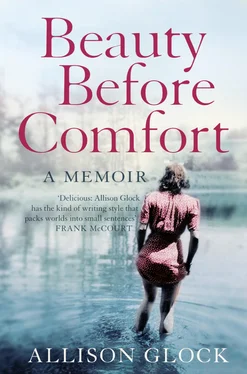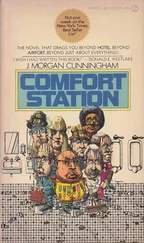As a child, I lived with my grandmother now and again when my mother needed a break, which was often, being as she was in college and broke and rearing me alone in an attic apartment short on lightbulbs and food. A few hours’ drive through the mountains brought me to my grandmother’s house, a small white vinyl-sided two-story with a cement front porch big enough for a glider and a backyard big enough for a game of horseshoes, but not much else. I would run inside to see her, and she would grab my chin, tell me to stand up straight, then push me into the kitchen, where she’d prepared graham crackers and honey on a heavy white plate that felt cool when I licked up the crumbs.
“That’s low-rent, little girl,” she’d say as I tongued the plate.
“But I’m hungry,” I’d whine.
“Fine to be hungry. Not fine to act like it.”
I must have been around ten years old when I realized that my grandmother was not like other grandmothers. Men would call—plumbers, pastors, Boy Scouts—and she would work them into a lather. “Oh my! My robe seems to have fallen open. How embarrassing.”
When the other town ladies dropped by the house in their elastic-waist pants and plastic shoes, my grandmother greeted them in suede go-go boots and a miniskirt.
“Great color on you, Dottie,” she’d say as her neighbors stood speechless, eyeing her naked legs and chunky turquoise pendant, no doubt wondering why in heaven’s name she’d bought that.
“I swanee,” they’d cluck as they left the house.
“Bless their hearts,” Grandmother would say as the screen door slammed.
Her golden years changed her little. Grandmother stayed chic. She did not wear her hair in a bun (she preferred to cut hers in the impish style of a French ingenue). She did not coo at babies. She did not dress in housecoats and slippers. She did not fatten up and sit in a rocker, patting her ample lap, and rasp in a warm, creaky voice, “Come up here and let Grandma read you a story.” She did not, in fact, allow us to call her “Grandma” or “Granny” or anything as pedestrian as “Memaw.” She permitted “Grandmother” and only that, and that is about where her grandmotherly qualities started and stopped. That’s not entirely true. She baked.
She was an expert baker, and she swore that the day she used a box mix for a cake was the day they might as well put her away. She also baked pies, splicing the butter into the flour with two knives, instead of using a mixer. While she baked, my grandmother sang. Her voice was lilting and sweet, which nearly overcame the raunch of the lyrics, songs of her own creation, which inevitably referenced the scatological.
“Ah lasagne, piss on ya, shit on ya,” she’d wail in full-on opera mode. I was young, but I was pretty certain that the other grandmothers I knew never sang phony arias about elimination while kneading pie dough.
No, my grandmother was different, had always been different, and, though she had paid dearly for it, had chosen to remain different, if one can choose those things.
Aneita Jean Blair was born and raised in Hancock County, West Virginia, same as me, until my mother found herself a decent fellow (from Kentucky), remarried, and moved us to North Florida, a dog’s piss away from the Georgia border. (In predictable hillbilly fashion, my birth father flew the coop when I was a toddler, leaving my mother and me to scrap for ourselves.) Although Florida offered more amusement for a child—The beach! Orange trees! Alligators!—I preferred West Virginia, in no small part because my grandmother lived there and she was amusing enough for anyone.
I begged to go back, and my mother was happy to comply, shipping me off every summer until I was in high school and the lure of West Virginia gave way to other, more hormonal yens.
I remember the drive to West Virginia from the Pittsburgh airport, the impossible corkscrew of the roads and the dented iron railings that lined them. I remember how dense the leaves of August were, how dark it could look in the holler even at noon. I remember the metallic scent of land raped by industry and how it rattled your teeth. I remember bony dogs running free down the highway, clotheslines strung heavy with overalls, the sound of gravel under the tires, the cool of the air, the supple dapple of the light, and how my grandmother’s voice rose and rang like a bell above it all as she sang on the drive home, the piercing white clarity of her song lending the whole worn scene a delicious flavor, a purpose.
“What’ll I do with just a memory to tell my secrets to?” she’d sing as the road rumbled by. “What’ll I do?”
Her voice sailed out the window, a stream of silk. Ka-chump, ka-chump went the road, and I would feel my body loosen with each mile, stretched open by her song and the exquisite melt of coming home.
As a child, West Virginia was my world. More specifically, Newell, West Virginia, a sad hump of a town paralyzed by poverty. I loved Newell with an inexplicable ferocity, the way a mother loves a screaming baby.
“You want to go where?”
Well, I wanted to go anywhere my grandmother was, because my grandmother sang songs and made men blush and fed me graham crackers with honey and showed me how to walk in heels and how to braid my hair and how to be more than I thought I was in the world.
“Grandmother, my braid is uneven!”
“A man on a flying horse wouldn’t see that.”
From her, I learned how to tell when a cake is cooked, how to cock my head to appear interested in someone else even when I wasn’t, how to make macramé plant holders, how to tell a joke, and, during one brash moment in a truck stop ladies’ room, how to smoke gracefully.
“Exhale like you’re bored. And look up. Always look up.”
The first lesson she ever taught me was that dancing matters. Grandmother felt that a person, especially a gentleman, who did not dance was not a person with whom one wanted to spend much time. When she did come across men she fancied who didn’t dance, she sent them away until they did. They always learned, because my grandmother was bitingly beautiful, and that is the second lesson she taught me—that beauty inspires, all of God’s beauty, but especially hers.
I can still see my grandmother sitting at her dressing table, looking into the mirror. It wasn’t much of a mirror, just a round fist-sized lens screwed atop a metal base painted to resemble gold. The base was wobbly, and to get an accurate reflection, she had to duck and bob around a crack in the lens. Still, it had the necessities: You could, with effort, still see yourself, there was a magnifying side (for plucking concerns), and it was portable, so should the house catch fire from some act of God, the mirror could be snatched up and carried to safety along with, should there be time, a handful of lipsticks and an eyeliner pencil. Children like myself, it was assumed, would fend for themselves.
Grandmother probably spent more hours in front of this mirror than she did the television. She didn’t gaze into it willy-nilly, but she believed in presenting herself well, and that required a healthy time commitment. It required devotion. It required ritual.
Every morning, Grandmother would don her robe and sit at the dressing table, her makeup brushes laid out beside her like surgical instruments. She started with moisturizer, a thick yellow cream she applied generously from scalp to neck. Then she dabbed on concealer, under the eyes and around the nostrils. On top of that came liquid base to even out the skin. She shook the bottle as if making a martini and then smudged the pale beige goo down to her throat, taking care to prevent a tide line at the collar. Then she brushed on blush, a dusting on both cheeks and the nose. Then eye shadow, two shades, and eyeliner, one shade. Then mascara, top and bottom lashes. Then lip liner, around the edges and then coated over the entire lip. Then lipstick. Then blot, on a tissue. Then more lipstick. Then blot, on a second tissue. Then more lipstick. Then a once-over of loose powder to “set” the face. She finished with a self-administered pinch on each cheek for color.
Читать дальше












